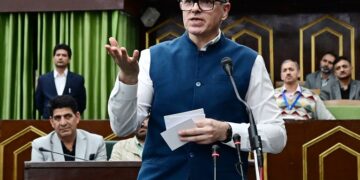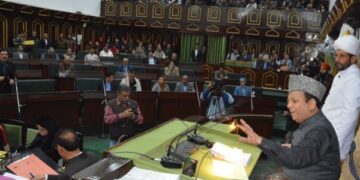New Delhi: Scientists have identified 100 pressing research questions on climate change and water resources in the Upper Indus Basin (UIB), which they say must be answered to protect the communities living in the region.
The UIB is located in the mountainous Hindu-Kush Karakoram Himalaya (HKH) region, of which Jammu, Kashmir and Ladakh is a part, and which feeds the river systems that supply the world’s largest network of irrigated agriculture.
Hundreds of millions of people across Pakistan, India, China, and Afghanistan depend on these water resources and so adapting to climate change is essential, the researchers, including those from the University of Kashmir in Srinagar, noted.
The study, published in the journal Earth’s Future, employed a ‘horizon scanning’ technique to identify 100 essential questions required for successful adaptation to ongoing and future climate change in the UIB.
The aim of the study is to identify knowledge gaps and opportunities in social and natural sciences to help inform climate plans, water management, and development policy, the researchers said.
The questions identified push the boundaries of current thinking and are grouped into overarching topics of governance and policy, socioeconomic processes, and earth system processes, they said.
Raising awareness of these pressing knowledge gaps will encourage researchers, funding bodies, practitioners, and policy makers to address them.
“Water resources in the UIB are under a range of ever-increasing pressures including population growth, industrialisation and of course the serious threat posed by climate change,” said British Antarctic Survey climate scientist Andrew Orr, who led the study.
“If we are going to successfully adapt to ongoing and future hydrological and climate change in the UIB we must address pressing knowledge gaps in social and natural sciences,” Orr said in a statement.
The researchers noted that the coming years will likely see dramatic changes to this region, and the questions they have identified must be addressed to prepare for such changes.
“The Top 100 research questions identified in the study would inform policymaking for developing strategies and action plans to combat climate change and hydrological extremes in UIB, of which Jammu, Kashmir and Ladakh is a part,” said Professor Shakil Ahmad Romshoo, from the University of Kashmir, who participated in the study.
“The study demonstrates a collaborative role for stakeholders within and outside the UIB to develop climate change adaption plans, and policies which will secure and protect the UIB communities that live there,” said Romshoo, who is also the Vice-Chancellor of Islamic University of Science and Technology (IUST) in Awantipora.
The authors noted that one of the main priorities of the study was to emphasise the importance of identifying knowledge gaps in both the natural and social sciences, as research efforts to identify the impacts of climate change on the latter have for a long time often been neglected in favour of the former.
The consequences of neglecting social sciences are that the understanding of the dynamics and impacts of climate change are often limited, they added.








